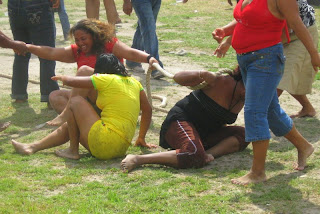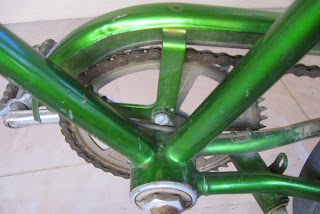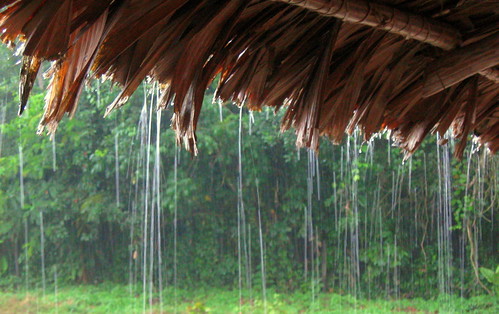I haven’t really written yet about what I am in Guyana for. So I should. And will. Now.
And by the way, the photos on this page have nothing whatsoever to do with the content. But everyone loves decomposing fish that look like spiky footballs and signs with amusingly bad grammar. Don’t they?
And by the way, the photos on this page have nothing whatsoever to do with the content. But everyone loves decomposing fish that look like spiky footballs and signs with amusingly bad grammar. Don’t they?
Anyway.
I am working with the Ministry of Education as the Special Needs Advisor for region 6, which is the area towards Suriname between the Berbice and Corentyne rivers. Mostly the region stretches a long way inland, but mostly people live on the coast, with a couple of Amerindian villages up the rivers and some remote farming communities a little way inland too. My placement is supported through VSO but I am paid and housed by the Ministry of Education. (Note: VSO is in my experience an excellent and valuable organisation that works in a targeted way to achieve sustainable change. They need money. Please give them some via my justgiving page. Thanks!) What the post of ‘Special Needs Advisor’ actually means in practice is largely up to me to decide. One of the main areas I am planning to focus on is making mainstream classroom teaching in primary schools more inclusive.
I saw something today that acts as a nice metaphor to explain what I mean.
This week, the main cricket ground in our region is hosting the national school sports tournament – three days of track, field, cycling and swimming events for school children and teachers from across the country. The education system here has pretty much ground to a halt to watch, organise or participate in the competition, so today I also went along to stuff myself full of fried rice, chow mein, barbecue chicken, honey roast peanuts, candy floss, plantain chips, biscuits, popcorn and lots of other goodies (most events in Guyana revolve around eating). And to watch some sports, cheering more or less randomly. And to admire the effort everybody makes in to dressing up for the occasion.
Two of the first events were the Under Ten Girl’s High Jump and the Under Twelve Girl’s High Jump.
The under tens went first. There were two officials setting up the bar, and three to monitor the jumps. The officials had carefully set up the bar to a measured height, which was about nose height for the average ten year old.
The first girl ran up from an angle, gamely attemted to jump awkwardly over the bar, came about a foot short, and knocked the bar off. The officials noted this on their notepads and reset the bar.
The next girl ran straight at the bar, and tried to leap it head first, knocking the bar off with her head. The officials noted this on their notepads and reset the bar.
The next girl ran straight at the bar, and then bottled out at the last minute, stopping just short of the bar and looking up at it with a ‘are you seriously expecting me to jump over that?’ expression on her face. One official raised a red flag. The others noted the result on their notepads.
The next girl ran straight at the bar, slowed down and ducked underneath it. One official raised a red flag. The others noted the result on their notepads.
The next girl ran straight at the bar, and slowed down and meekly jumped carefully up onto the mat, taking the bar with her.
The officials noted this on their notepads and reset the bar.
This continued for about twenty contestants, for three attempts each. Not one of them cleared the bar. Only two came anywhere remotely close. Most were clearly just going through the motions by the final round. One was stretchered off the field.
The officials then set up for the under twelves, by raising the bar up to a new measured height, about nose height for the average twelve year old. And the contestants proceeded to do exactly the same as the under tens.
Not once did any of the officials say ‘maybe we should try starting them on a lower height’. And not once did I see anyone clear the bar.
So, what does this have to do with “making mainstream classroom teaching in primary schools more inclusive”?
Well, this kind of experience is unfortunately the reality of school life for many children. The bar is set too high, and just keeps getting moved up further and further beyond their reach. They aren’t taught the skills necessary for them to succeed. And so they get left further and further behind. And eventually, understandably, they give up.
The children could easily have had the correct jumping skills modelled for them and had a chance to practice these skills on an easy task first. And once it became obvious that most of the children were failing, the bar could have been lowered to match their ability and give them a chance to succeed.
What I would love to achieve is to help teachers to develop the skills and the confidence to explicitly teach and model the individual skills required for a task, to give tasks that allow all children to succeed but still stretch the more able ones, and to modify the schemes of work to suit the children, rather than rigidly sticking to a curriculum that is often far beyond the comprehension of the class. I also need to make sure that the systems supporting teachers encourage and support them in doing this.
If I can help move things in that direction I will be very happy.
Of course, there are a million other things I could concentrate on too. Improving training in the special school. Raising awareness and decreasing stigma associated with disability among teachers and parents. Finding children who are not attending school and looking at how to get them into school. Teaching teachers about specific learning difficulties. Campaigning for improved physical access to school and availability of aids for disabled people. Building systems to allow parents or other students to support those with difficulties. And each one of these could easily and constructively take much more than two years of my time.
But for now, mainly, inclusion is what I will be concentrating on. Partly because I think this could make the biggest and most sustainable change for the largest number of children. But mostly because I love a good metaphor.
www.guyanadan.blogspot.com
















